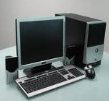Following are the main basic components of the computer: | |
1. Input Unit 2. Output Unit 3. Central Processing Unit( CPU / Processor) 4. Memory Unit 5. Storage Unit | |
1. Input Unit Input unit consists of input devices. Input devices are used to enter data and instructions into computer memory. Examples of input devices are Keyboard, mouse, scanner, digital camera and microphone etc. 2. Output Unit Output unit consists of output devices. Output devices are used to show results produced by computer after data processing. Examples of output devices are Monitor, Printer, plotter, data projector speaker etc. 3. Central Processing Unit Central processing unit is also called CPU or Processor. It is the brain of the computer. It performs data processing. It controls overall operations and compents of the computer. CPU consists of three main parts: a)Arithmetic Logic Unit or ALU ALU performs arithmetic and logical operations on data. b)Control Unit Control unit controls overall operations and components of a computer. c)Registers Registers are very small and very fast temporary memory areas in CPU. Registers are used to store currently processed data and instruction. 4. Memory Unit Memory unit consists of memory devices to store data temporarily or permanently. Examples of memory devices are RAM and ROM. 5. Storage Unit Storage unit consists of storage media. Storage media are used to store large amounts of data permanently. Examples of storage media are Hard disk, CD, DVD and Zip disk etc. | |
Thursday, February 17, 2011
What are the basic units or components of a computer
Friday, February 11, 2011
What are Different Types of Computer
Thursday, February 10, 2011
What are Charachteristics of Computer
| Following are the important characteristics of a computer: 1. Speed Computers work at a very high speed. They are much faster than humans. | |
A computer can perform billions of calculations in a second. Computer speed is measured in Mega Hertz (MHz). 2. Storage A computer can store large amounts of data permanently. Users can use this data at any time later in future. 3. Processing A computer can process the given instructions. It can perform different types of processing like addition, subtraction, multiplication and division. It can also perform logical functions like comparing two numbers. 4. Accuracy Accuracy means the capability to provide results without any errors. Computer can process large amounts of data and produce 100% accurate results. 5. Recalling A computer can recall the stored data and information at any time, as and when required. 6. Control Sequence A computer processes data in a sequence according to the given instructions. 7. Consistency Computer works in a consistent way. It does not lose concentration due to heavy work. Computer performs all jobs with equal attention. 8. Communication We can connect two or more computers to share data and hardware (printer, hard disk, CD-ROM Drive). We can send messages and chat with other people in world through Internet. 9. Versatile A computer can perform different types of tasks. We can use a computer in hospital, bank or at home. 10. No Feelings Computer has no feelings. It cannot accept feelings as an input. Computer cannot work according to the mood of the user. It cannot be affected by sorrows and happiness. 11. No Intelligence Computer itself is not intelligent. It only follows the given instructions. If a computer is given a program for addition it cannot perform subtraction by itself. 12. Cost Reduction Computer can reduce cost. We can do a work in less time and cost by computer. A single person, with computer, can do work of many people in an office. 13. Diligence Computer has the ability to work for long times without tiredness. | |
What is Computer
Computer is an electronic machine that takes data and instructions, processes data according to the given instructions, gives results and stores them. Today, computers are being used in every field of life. It can be used for different tasks. | |
It is used for data processing. It is used to calculate or perform some mathematical work. It can be used for word processing, record keeping, listening music, playing computer games etc. And above all, it is being used to access Internet. | |
Subscribe to:
Comments (Atom)








